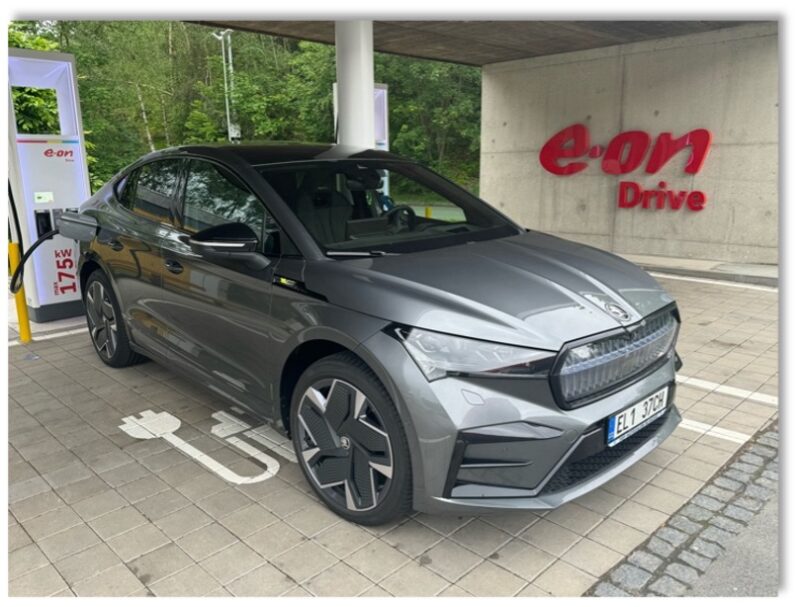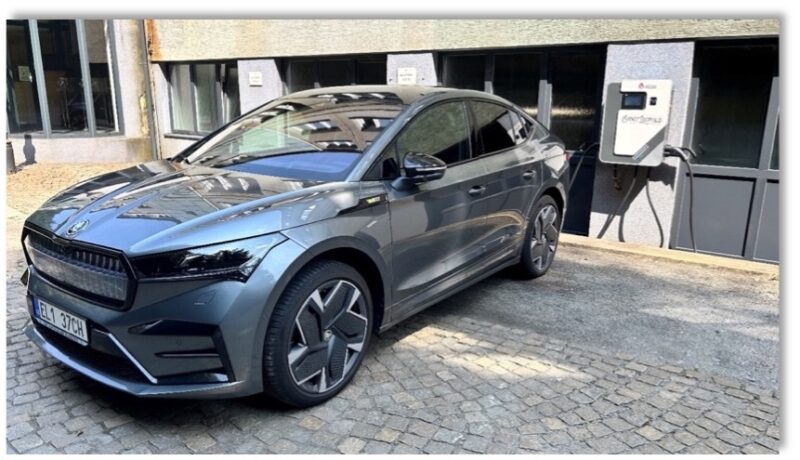CORPORATE ELECTROMOBILITY AND ITS FUTURE
As an enthusiast of cars and motorcycles with combustion engines, I have to admit that I initially approached electromobility with a certain level of skepticism. However, it is undeniable that this new and innovative technology brings interesting opportunities worthy of attention.
The Ernst Leopold foundry plays a significant role in the production of press tools for the automotive sector, with an increasing number of vehicles being fully electric. Naturally, we are becoming more interested in electromobility and its role in the future of our corporate fleet.

Choosing an Electric Vehicle
When selecting an electric vehicle, my interest focused on the German VW group, mainly due to its support of the European, and thus Czech, market. However, I was surprised by the reluctance to loan and test premium brand electric models. Eventually, I found a welcoming approach at TOP AUTOSALON BLANSKO, and thanks to financing from Erste Leasing, I decided on the ŠKODA Enyaq Coupé RS 4×4 85 iV model, equipped with a heat pump. This car not only met our technical requirements but also supported the company’s commitment to sustainability. Along with the vehicle, a charging station with a power output of 44 kW DC and 2x 22 kW AC was purchased.
During one month, I drove 7,000 kilometers with an average daily range of 200–300 km. On a single charge, I regularly covered 500 km, and sometimes even more, thanks to energy regeneration. The 82 kWh battery and fast charging at 150 kW stations convinced me that electromobility is indeed a functional alternative for our company’s needs.
Price as a Key Factor
One of the most crucial questions related to electromobility is the price. If European carmakers do not realize that electric cars are too expensive for most ordinary people in the Czech Republic and Europe, they risk making their cars unsellable. Currently, the high prices of electric vehicles are the main obstacle to the widespread adoption of this technology.
Electric Vehicle Range
Another frequently discussed topic is range. On a single charge, I usually covered 500 kilometers, but thanks to energy recuperation, I was able to reach up to 650 kilometers. Recuperation is a technology that reduces energy consumption and recharges the battery during driving, especially when braking. Many factors influence the range, including vehicle load, outside temperature, and the chosen route. On highways at higher speeds, I noticed higher energy consumption, where the range can decrease by 100 or more kilometers, representing a reduction of 30–40% compared to regular driving. The technique and driving style are also important.
It is essential to consider the distance you usually cover daily. For instance, at Ernst Leopold, most company vehicles do not travel more than 200 kilometers daily, meaning a battery capacity for 400 kilometers is more than sufficient.
Charging Costs and Speed
During the 7,000 kilometers, I most frequently charged the electric car at home using our own photovoltaic power plant, at the company, and at fast-charging stations. Fast charging at 150 kW stations took approximately 25 minutes. The total charging costs for the month amounted to just under CZK 3,000, which means that the cost per kilometer was less than CZK 1. For companies, savings on fuel are the first significant economic benefit of electromobility.
It is not yet clear how the situation will develop in the future concerning the consumption tax, as the state will need to compensate for the lost revenue from gasoline and diesel. Entrepreneurs are already required to have their charging station registered and to report consumption at all company charging stations, with part of the energy required to come from renewable sources.
Adequate Charging Network
The current charging station network is sufficient, and concerns about overcrowded stations have not been confirmed. With modern applications, it is easy to check the availability of stations and plan charging in advance. Unlike a combustion engine car, which can be simply refueled and you can immediately continue your journey, an electric car requires more planning. Especially on longer highway trips, it’s good to know in advance where available chargers are located. Although fast charging on the road is somewhat more expensive than at home or the office, it does not significantly affect the overall cost per kilometer. Charging usually takes 20–25 minutes, giving you time for a coffee or a short rest before continuing your journey.
In the corporate setting, especially if you manage a larger fleet of electric cars, I strongly recommend acquiring a powerful DC charger. It will be useful not only for your own needs but also in case a customer or partner arrives and needs to quickly charge their vehicle.
Ease of Charging and Provider Flexibility
Charging an electric vehicle is very simple. Just an app, chip, or card — and you can charge almost anywhere. Companies like ČEZ, E.ON, or PRE offer roaming services, so you don’t have to worry even when traveling abroad.
Long-Distance Trips: A Weakness of Electric Cars
On longer trips, for example over 1,000 kilometers, electric cars still lag behind combustion engines. The time spent at charging stations is a disadvantage for certain professions, such as salespeople. A salesperson cannot afford to wait at a charger and risk not arriving on time to meet a client. This situation can be resolved by having a few combustion engine vehicles in the company fleet for long business trips.
Operating Costs and Maintenance
I cannot yet provide exact figures on operating costs and maintenance, but after 10,000 kilometers, I did not have to deal with any significant issues. An electric motor has fewer moving parts than a combustion engine, which reduces the need for maintenance. I estimate that maintenance costs are up to 50% lower, while the lifespan of an electric car is longer.
Driving Characteristics
The driving characteristics of an electric car are incomparable. A quiet, smooth ride without vibrations and noise is a major advantage over combustion engine cars. I recommend trying an electric car for a longer period, ideally at least a week, because a short test drive will not give you a complete picture of what an electric car offers.
The Future of Electromobility
This article does not cover all aspects of electromobility, such as environmental impacts or the overall influence on the environment. However, as a company, Ernst Leopold plans to transition to electromobility, mainly due to savings in operating costs, safety, and emission reductions. Electric cars are the future, with the potential to improve the quality of life and business.
None of us like making changes that force us out of our comfort zone – and this applies to electromobility as well. Usually, skeptics immediately appear, highlighting everything that could go wrong. Before we even consider it ourselves, we already hear that electric cars do not have enough range, there is nowhere to charge them, or they are too expensive.
My opinion is clear: stop comparing combustion engines to electric cars. These are two incomparable technologies, each with its specific advantages and challenges – and most importantly, we are only at the beginning. While combustion engines have been perfected over many decades, electric cars still have room for further development.
China understood the importance of this technology several years ago, became a world leader in the field, and now sets the trend in electromobility, offering electric cars at significantly lower prices. I am convinced that the electric car is the future, both for ordinary users and companies. With the development of technologies such as photovoltaic power plants, we will be able to produce energy at home and drive “almost for free,” making the electric car even more attractive. As I mentioned earlier, the question remains as to how the state will handle the situation regarding excise tax in the future.
To avoid basing everything solely on my own experience, I also provided the electric car to several employees who had the opportunity to test the vehicle for at least a week. This gave them a real impression of its daily operation, and their opinions largely align with mine. After careful consideration of all experiences and with some time passing, I have concluded that Ernst Leopold will undoubtedly continue its journey toward electromobility. This step will not only reduce our operating costs but also contribute to fulfilling our commitment to sustainability and emission reduction, which is part of our long-term goals.
I believe that with further development and innovations, the transition to electromobility will become increasingly accessible for everyone, whether individuals or companies. With the expansion of charging infrastructure, technological advances, and overall support, electromobility is an inevitable part of the future operation of corporate fleets. For companies like Ernst Leopold, electromobility proves to be a logical step.

ERNST LEOPOLD COMPANY VISION
Long-term stability for the company and its employees, which involves maintaining a competitive market position closely tied to employee care and efficient management of production processes.
Building a good company reputation. Although it may not be immediately apparent, this is one of the most valuable assets. Therefore, we aim to build a positive reputation based on product quality, transparency in business relations, and social responsibility.
Investing in the future, both technologically and in human resources, to ensure we can keep pace with the rapidly changing industrial environment on all fronts.
Modern management is a key element in implementing modern information systems and production technologies, enabling better process tracking, faster response to market changes, and overall increased efficiency.
Reducing the carbon footprint and energy consumption. As a company, we are fully committed to taking an active approach in this area.
Achieving profits, sustainable growth in company value, and overall prosperity. Maintaining financial stability and developing new market segments will remain at the forefront in the coming year.
I believe that our shared values and vision will continue to drive us forward, enabling us to meet the company’s long-term goals and contribute to its success.
Zdeněk Tužička
Managing Director
Ernst Leopold s.r.o.
More news
Ernst Leopold s.r.o. is Committed to Sustainability: 100% Energy from Renewable Sources
Ernst Leopold s.r.o. is pleased to announce that in 2024 it completely transitioned to the use of electricity from renewable sources. This step is part of our...
CORPORATE ELECTROMOBILITY AND ITS FUTURE
As an enthusiast of cars and motorcycles with combustion engines, I have to admit that I initially approached electromobility with a certain level of skepticism....
Collaboration between Ernst Leopold and Brno University of Technology
The collaboration between the Blansko Foundry and the Department of Foundry Engineering, Faculty of Mechanical Engineering, Brno University of Technology has...
©2025 Ernst Leopold s.r.o. Processing of personal data Cookies settings
